Event Archives
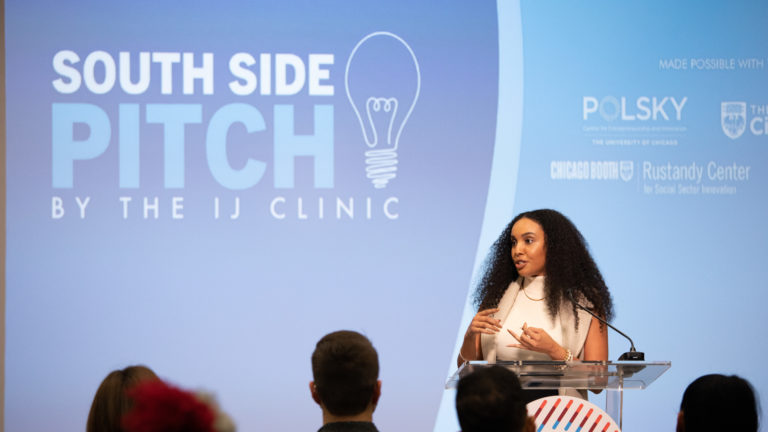
Annual South Side Pitch Competition
The South Side of Chicago is full of entrepreneurs who deserve recognition for building businesses in the community. Those businesses provide a living for the entrepreneurs themselves and change the lives of neighbors, employees, and customers. For…
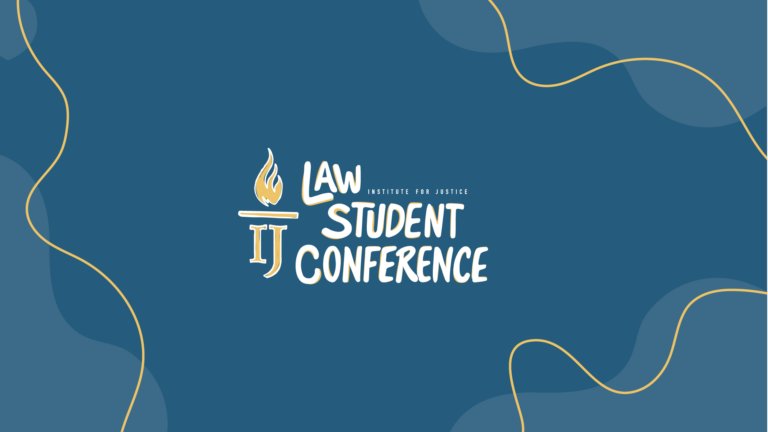
IJ’s Annual Law Student Conference
The Institute for Justice (IJ) is pleased to offer our acclaimed Law Student Conference again this year. The Law Student Conference is an annual tradition of nearly thirty years, drawing law students from across the country (as…
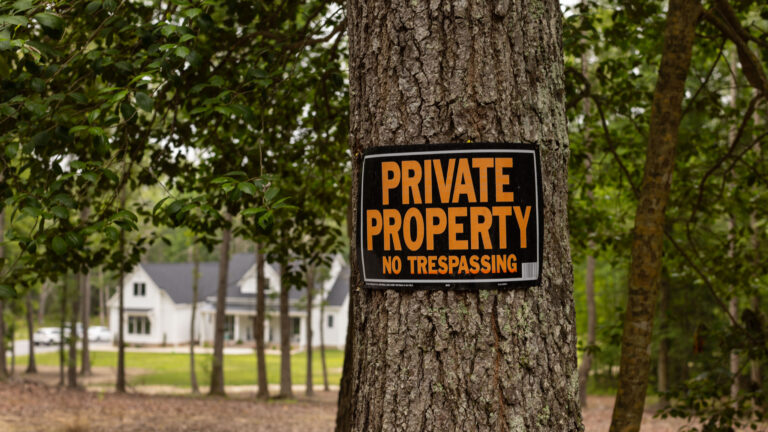
A Century of Government Trespassing: The Open Fields Doctrine at 100
2024 marks the 100th anniversary of the “open fields doctrine,” the judge-made exception to the Fourth Amendment. With it government officials, including the police, can trespass on 96% of private land in the United States without committing a “search.” To observe the first 100 years of the “open fields doctrine” and the possibility that the next 100 years will be different, IJ invites you to a conference examining the history of the doctrine and its future.
Law Student Event: Spring 2024 Legal Intensive
Spring 2024 Legal Intensive The Premier One-Day Public Interest Law Program Hosted in IJ’s Austin, TX Office Saturday, March 23, 2024 We are thrilled to announce that IJ will host our seventh Legal Intensive in…
Shaping Justice: IJ Takes First Amendment Retaliation to SCOTUS
Shaping Justice: IJ Takes First Amendment Retaliation to SCOTUSYou are invited to join the Institute for Justice in Austin for an afternoon of dialogue and listening in to the SCOTUS oral argument in…
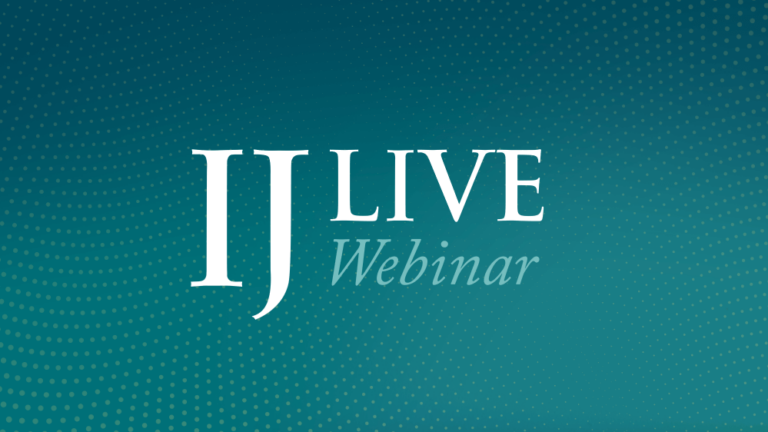
IJ LIVE – Trials
In this webinar, IJ Attorneys Will Aronin and Ben Field will share their first-hand experiences advocating for IJ & our clients in front of judges and juries nationwide. In the context of some of our…
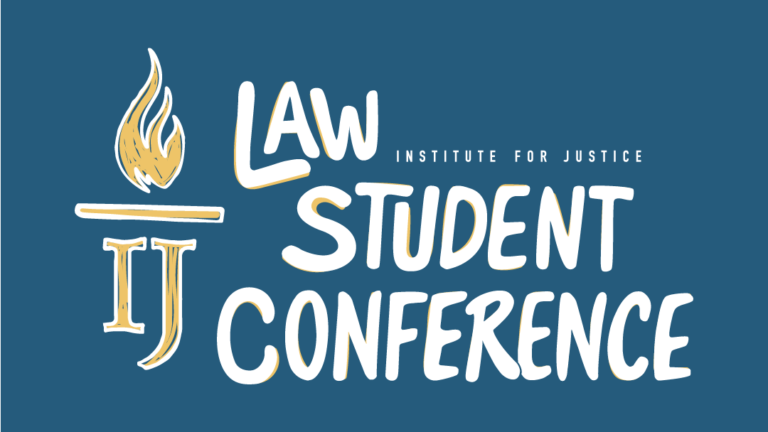
IJ’s Annual Law Student Conference
The Institute for Justice (IJ) is pleased to offer our acclaimed Law Student Conference again this year. The Law Student Conference is an annual tradition of nearly thirty years, drawing law students from across the country (as well as our summer Dave Kennedy Fellows) to our headquarters in Arlington, Virginia for an immersive weekend experience to learn about IJ and public interest law. This event teaches what law school often does not – how to find and litigate public interest cases in the real world. We’ll share our public interest strategies, our current areas of litigation, and how we put together a case from start to finish. And most importantly, our clients will share their stories and explain what it means to team up with IJ and fight against government abuse.
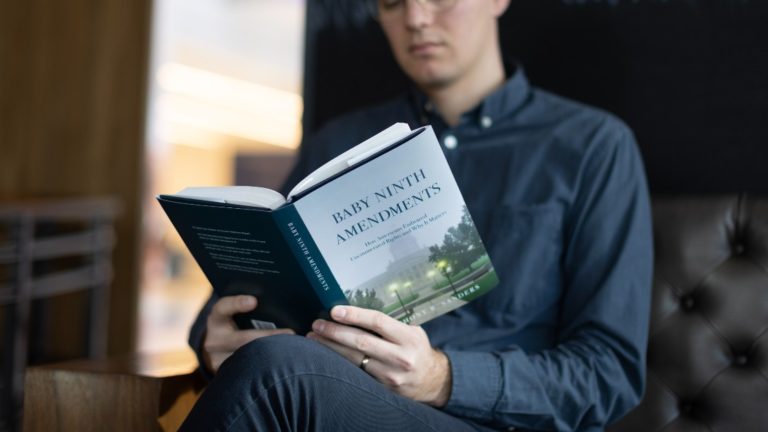
Baby Ninth Author Meet and Greet
Meet the author of the new book Baby Ninth Amendments: How Americans Embraced Unenumerated Rights and Why It Matters, published by University of Michigan Press. Joined by others from the Institute for Justice, Anthony Sanders…

Dinner and Discussion: South Bend Code Enforcement
Are you being fined for the condition of your home by the City of South Bend? At the Institute for Justice (IJ), we believe that South Bend may be abusing its power to fine you,…
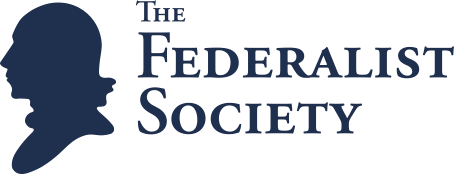
Protecting our Freedoms: State Constitutions, Baby Ninth Amendments, and Understanding our Rights
Please join the Philadelphia Lawyers Chapter for an evening reception and event featuring Anthony Sanders. Anthony will be discussing his new book, “Baby Ninth Amendments: How Americans Embraced Unenumerated Rights and Why it Matters.” Members: $10…
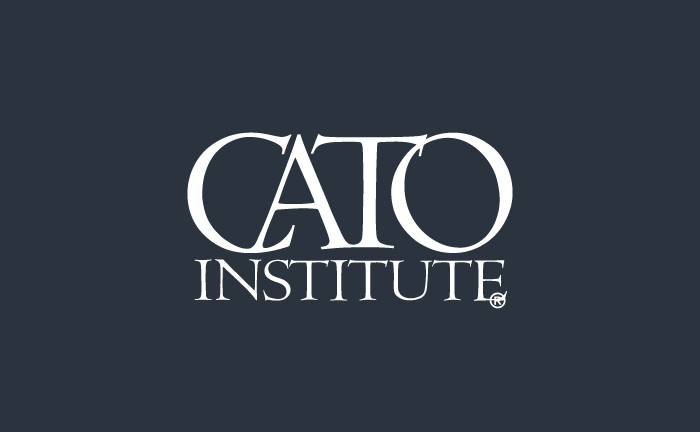
Baby Ninth Live Online Book Forum
Join us online for the launch of an inspiring new book from Anthony Sanders of the Institute for Justice, Baby Ninth Amendments: How Americans Embraced Unenumerated Rights and Why It Matters (University of…
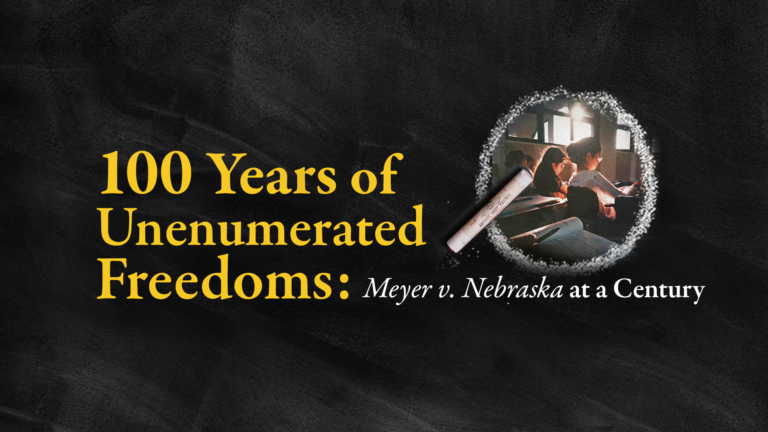
100 Years of Unenumerated Freedoms: Meyer v. Nebraska at a Century
Please join the Center for Judicial Engagement at the Institute for Justice on March 31, 2023, when we celebrate the centenary of this monumental moment for liberty and the foundation for so much in the years that followed. We will begin with our keynote speaker and the foremost historian of the decision, Professor William G. Ross of Samford University’s Cumberland School of Law. He will detail the case’s background and drama, including the characters involved, what led the Court to rule as it did, and its immediate aftermath. Then we will welcome four different panels of experts to discuss the various ways the decision has shaped numerous areas of constitutional law, including the right to earn a living, the right to raise a family, the First Amendment’s protections of speech and religion, and the incorporation of the Bill of Rights against the states. Our last panel will then consider the continuing influence of Meyer on unenumerated rights as we look to the future.
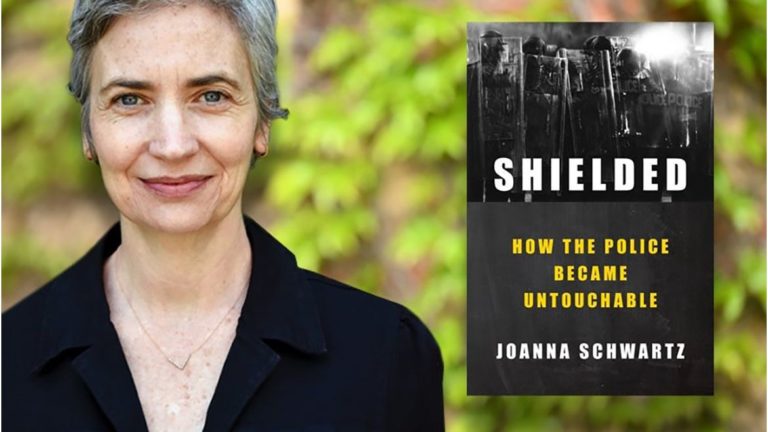
Joanna Schwartz “Shielded–How the Police Became Untouchable”
Professor Joanna Schwartz is one of the most respected and prolific scholars on qualified immunity. In her latest book, Shielded: How the Police Became Untouchable, Professor Schwartz brilliantly examines how the legal system in general, not just qualified immunity, prevents accountability for police misconduct. On March 7, 2023, the Georgetown Center for the Constitution and the Institute for Justice will host a day-long symposium to mark the publication of this important and timely scholarship. The symposium will kick off with a live recording of the Institute for Justice’s Short Circuit podcast, featuring Joanna Schwartz and three additional distinguished professors in the field of government accountability. Following the recording, you will hear from real people whose lives have been affected by government abuse, and from a group of public-interest lawyers who will tell you all about the future of civil rights litigation. The symposium will culminate in a keynote address by Professor Schwartz with introductory remarks from Professor James Pfander. The day will conclude with a reception and book signing.
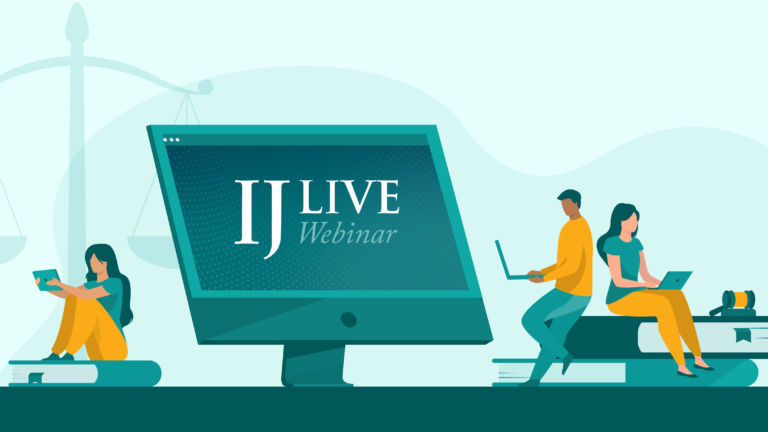
IJ LIVE Webinar
In this webinar for IJ Partners Club, Guardians Circle, and Four Pillars Society members, IJ’s Donor Relations Manager Rosalind Hanson and IJ Attorney and Special Counsel to IJ’s Four Pillars Society Rob Peccola will discuss SECURE ACT 2.0, which contains a slate of changes to the retirement system. Attendees will gain insight into how these changes might impact them and their families in the future. The event will also highlight a unique opportunity available through the law to maximize charitable giving to the causes you most care about. IJ LIVE webinar invitations are extended to IJ’s most loyal supporters to provide an opportunity to hear from IJ experts regarding a variety of topics, from behind-the-scenes IJ updates to changes to the legislative and litigation landscape.

Policymaker Briefing on License to Work 3: Removing Barriers to Workforce Participation in Your State
The Institute for Justice recently published the third edition of License to Work. This new report provides an updated snapshot of state licensing requirements for 102 lower-income occupations – including barbers, landscape contractors, and interior designers – across all 50 states, the District of Columbia, and Puerto Rico. We invite you to join the Institute for Justice, lawmakers, and policy experts as we take a deep dive into the study and occupational licensing barriers. Lisa Knepper, Senior Director of Strategic Research, will provide an overview of the report and highlight key findings. Meagan Forbes, Director of Legislation and Senior Legislative Counsel, and Jessica Poitras, Legislative Counsel, will discuss how to use this research to advance legislative opportunities in your state. The program will be moderated by Trace Mitchell, Litigation Fellow.

Student Event: Fall 2022 Legal Intensive
We are thrilled to announce that IJ will host our sixth Legal Intensive in person on November 5th, 2022 at the Harvard Faculty Club in Cambridge, MA. For over 30 years, IJ has hosted an annual law student conference with law students from across the country near our headquarters office in Arlington, Virginia. We are excited to continue to offer an opportunity for students to participate in an immersive and practical day of learning right in their own backyards. Our Legal Intensives are intended to supplement the legal theory and skills that students learn in the classroom. The experts at IJ will teach attendees about public interest law and how to take what students have learned so far in law school and put it into action.
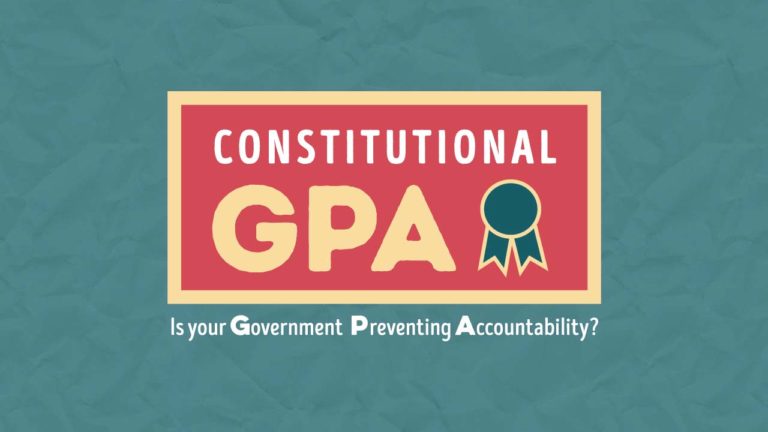
Constitutional GPA Launch @ UCLA
The Institute for Justice is launching an interactive civil rights study, Constitutional GPA, that makes it easier to overcome qualified immunity by identifying clearly established constitutional law in each federal circuit. We also catalog each state’s immunities and grade them—state, circuit, and both—on how hospitable they are to civil rights claimants. Come see us demo the interactive study, explain its uses, and discuss our findings from creating it. We will also update you on the latest in our litigation efforts to defeat qualified immunity and the other obstacles to justice in American courts. We will introduce you to an amazing IJ client, whose story exemplifies the unaccountability that inspired us to undertake this project.
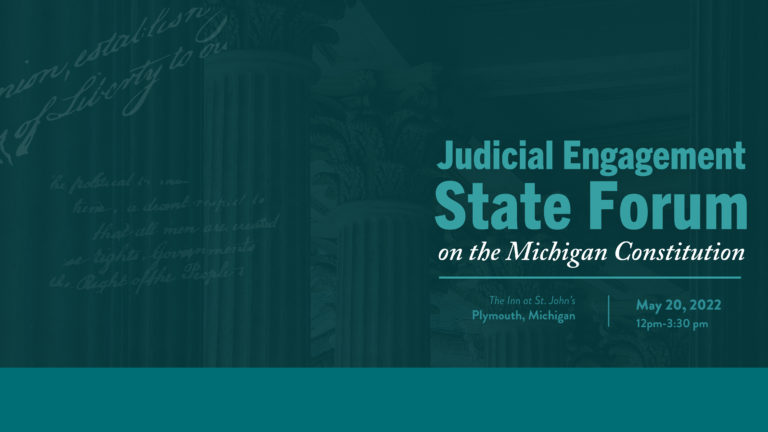
Center for Judicial Engagement’s Forum on the Michigan Constitution
Join us on Friday, May 20, 2022 at The Inn at St. John’s in Plymouth, Michigan, for an exciting exploration of judicial engagement and the Michigan Constitution! Judicial engagement is the idea that courts should demand the government provide real evidence and real arguments when examining whether it has violated the law. This is usually discussed with the U.S. Constitution in mind. But Michigan has a constitution too! And Michigan’s judges interpret the state’s constitution and apply it against state and local governments. What should judges do in those cases? And how should we think about the Michigan Constitution, given that it has been rewritten many times over so many years?
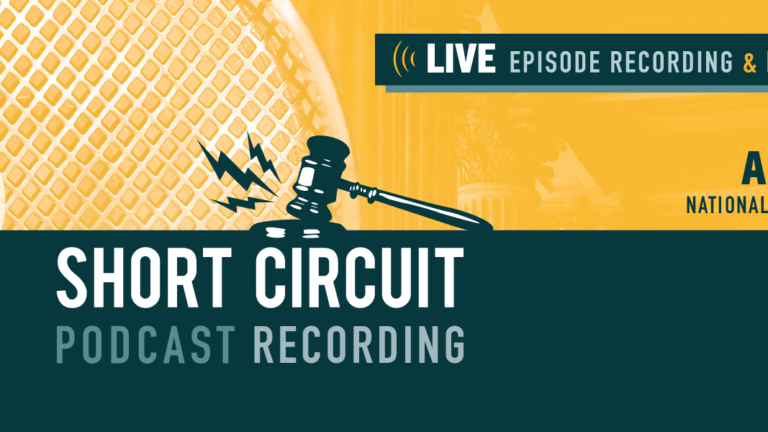
Short Circuit Live at the National Press Club
Please join us in person to see a special Short Circuit Live! It doesn't get much better than this: three amazing SCOTUS advocates and the Institute for Justice, at the National Press Club in Washington, D.C. Come listen to a live recording of IJ's Short Circuit podcast with Kelsi Brown Corkran, Lisa Blatt, and Paul Clement. They will discuss three recent D.C. Circuit opinions with IJ attorney Anya Bidwell as well as reminisce about clerking on one of the most influential courts in the nation. A short reception will follow the recording with hor d’oeuvres and drinks provided. Whether you’re a current clerk, an experienced practitioner, a law student, or a normal human who simply likes Short Circuit, we’d love to see you! Please RSVP ASAP as space is limited.

IJ-Florida Celebrates 10 Years
We have now been litigating for liberty for ten years in the Sunshine State! We are proud to say that, during that time, we have achieved victories in all four of IJ’s pillars—economic liberty, free speech, property rights, and school choice. For those in the Miami area, we would love to celebrate with you in person at Briza on the Bay on Thursday, February 24. Join us at 6:30 p.m. for a reception with refreshments, along with remarks at 7:30 p.m. RSVP below.
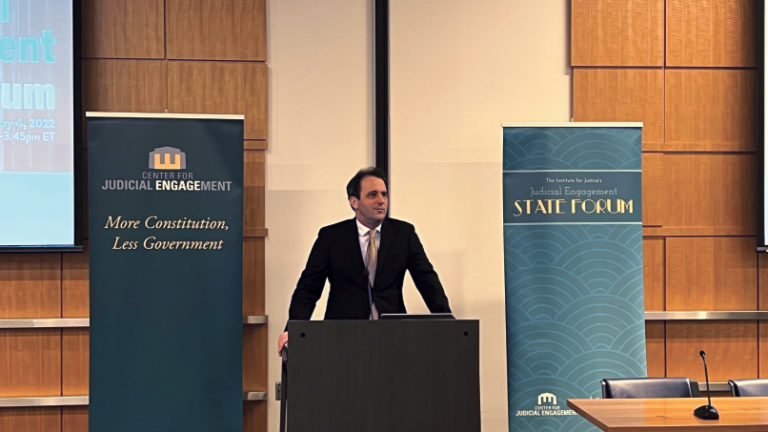
Center for Judicial Engagement’s Forum on the Georgia Constitution
Join us on Friday, February 4, 2022 at Georgia State University College of Law, for an exciting exploration of judicial engagement and the Georgia Constitution! Judicial engagement is the idea that courts should demand the government provide real evidence and real arguments when examining whether it has violated the law. This is usually discussed with the U.S. Constitution in mind. But Georgia has a constitution too! And Georgia’s judges interpret the state’s constitution and apply it against state and local governments. What should judges do in those cases? And how should we think about the Georgia Constitution, given that it has been rewritten many times over so many years?

Does the Will of the People Actually Exist?
When a court refrains from declaring a law unconstitutional it often explains that the law represents the “Will of the People” and that mere judges should invalidate that “Will” very sparingly. But what actually is the “Will of the People?” Does it even exist in the first place? And even if it does to some degree, how many of our laws really exist because of it? Further, what do the answers to these questions have to say about judicial review? If the “Will of the People” isn’t all it’s often thought to be, does that mean courts should be more engaged with finding laws to violate the Constitution?
Outrage Legislation: Civil Rights & Section 1983 at 150 Years
On April 20, 1871, President Grant signed into law the Ku Klux Klan Act, the Reconstruction Congress’s latest effort to address the ongoing terror rampant in the post-Civil War South. Section 1 of the Act created a private cause of action against “any person who, under color of any law . . . shall subject, or cause to be subjected any person . . . to the deprivation of any rights, privileges, or immunities secured by the Constitution of the United States.” Although most of the Act is no longer on the books, Section 1 lives on, found today in the U.S. Code at 42 U.S.C. § 1983. After it came into being, Section 1 sat dormant for 90 years. In 1961, it burst forth to protect against government abuse and compensate its victims. Perhaps the most important civil rights law of all time outside of the Constitution itself, it’s known by all civil rights lawyers simply as “Section 1983.”
Pennsylvania Judicial Engagement State Forum
Join us on Friday, October 16, 2020, for an exciting exploration of the Pennsylvania Constitution! Judicial engagement is the belief that the courts should not defer to the political branches when examining whether those branches have violated the law. This is usually discussed with the U.S. Constitution in mind. But Pennsylvania has a constitution too! And Pennsylvania judges interpret the state’s constitution and apply it against state and local governments. What should judges do in those cases? And what in the state’s constitution have we forgotten about and need to reaffirm and reinvigorate?
